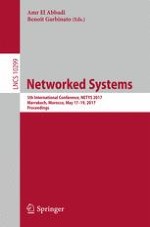Abstract
The design of distributed gathering and convergence algorithms for tiny robots has recently received much attention. In particular, it has been shown that the convergence problem, that is, the problem of moving robots close to each other (i.e., inside an area of some maximum size, where the position of the area is not fixed beforehand), can even be solved for very weak, oblivious robots: robots which cannot maintain state from one round to the next. The oblivious robot model is hence attractive from a self-stabilization perspective, where the state is subject to adversarial manipulation. However, to the best of our knowledge, all existing robot convergence protocols rely on the assumption that robots, despite being “weak”, can measure distances.
We in this paper initiate the study of convergence protocols for even simpler robots, called monoculus robots: robots which cannot measure distances. In particular, we introduce two natural models which relax the assumptions on the robots’ cognitive capabilities: (1) a Locality Detection (\(\mathscr {LD}\)) model in which a robot can only detect whether another robot is closer than a given constant distance or not, (2) an Orthogonal Line Agreement (\(\mathscr {OLA}\)) model in which robots only agree on a pair of orthogonal lines (say North-South and West-East, but without knowing which is which).
The problem turns out to be non-trivial, as simple strategies like median and angle bisection can easily increase the distances among robots (e.g., the area of the enclosing convex hull) over time. Our main contribution is deterministic self-stabilizing convergence algorithms for these two models. We also show that in some sense, the assumptions made in our models are minimal: by relaxing the assumptions on the monoculus robots further, we run into impossibility results.
